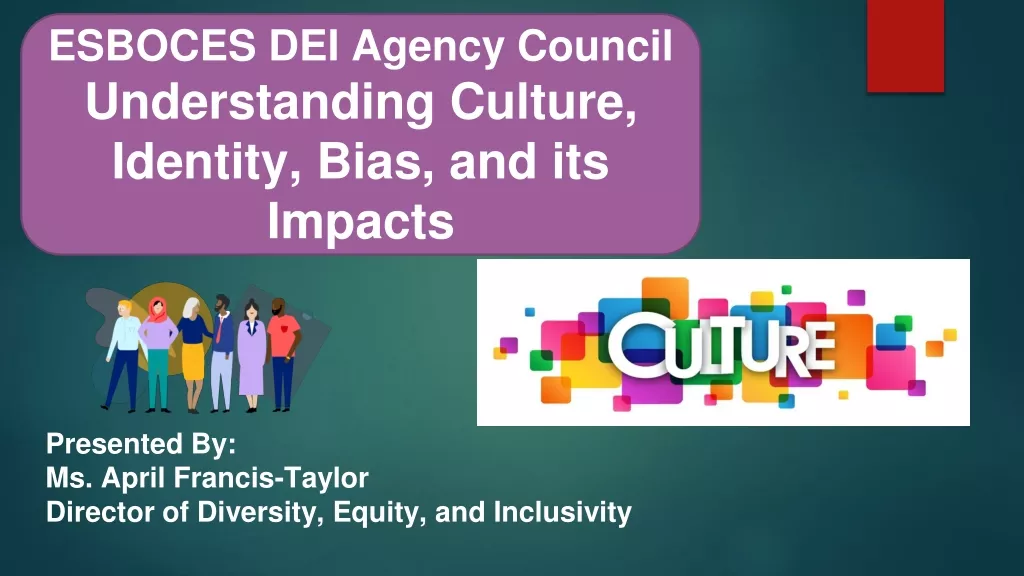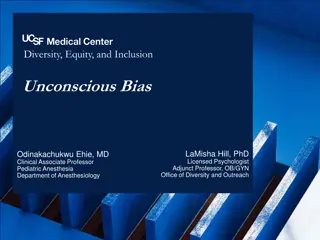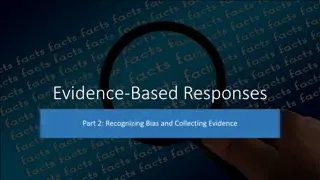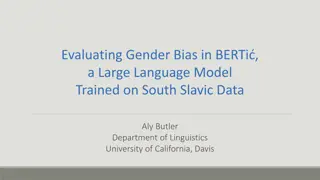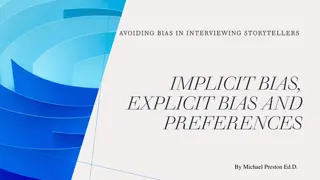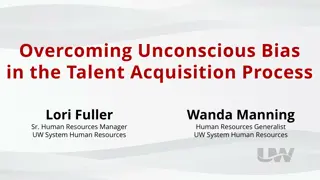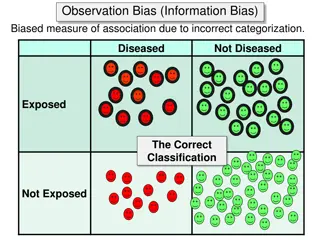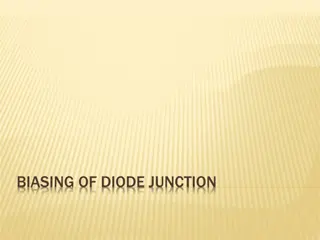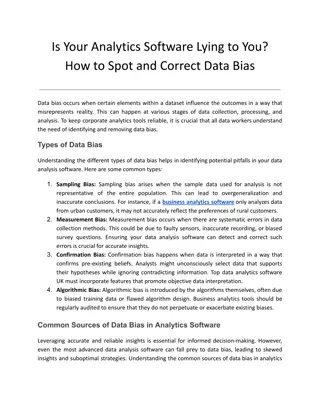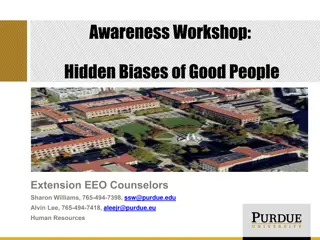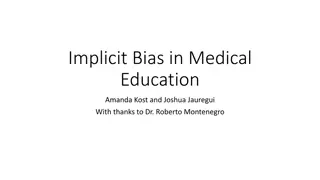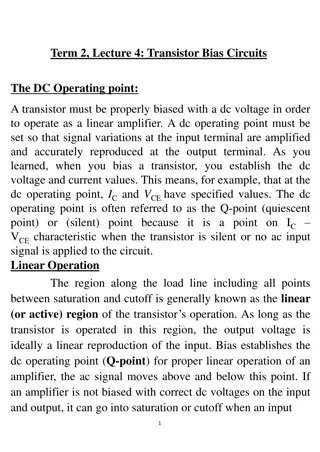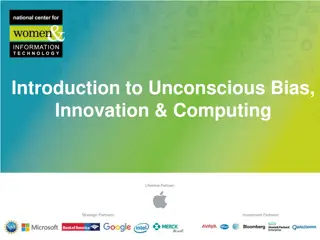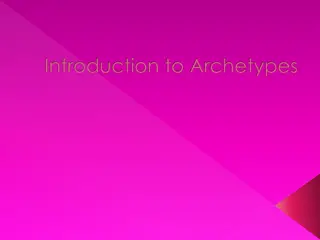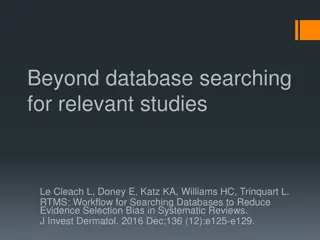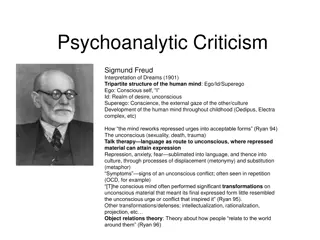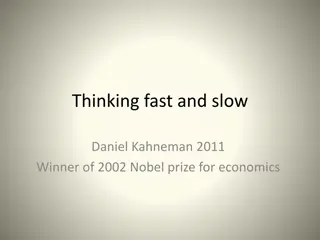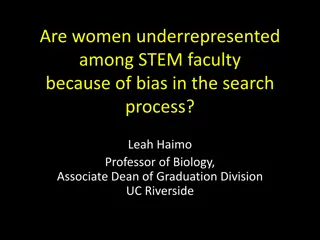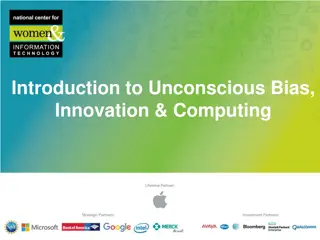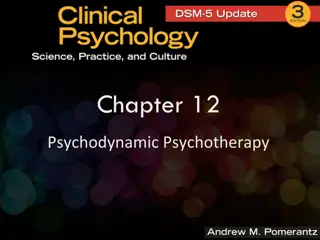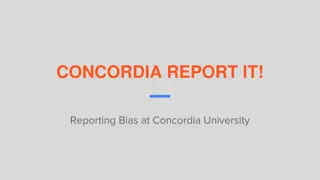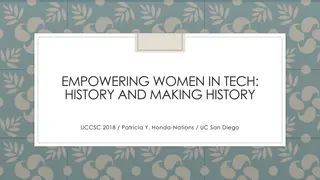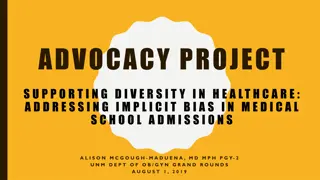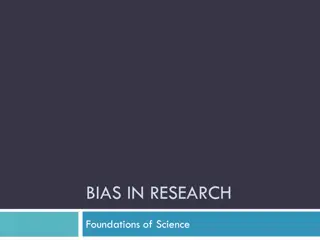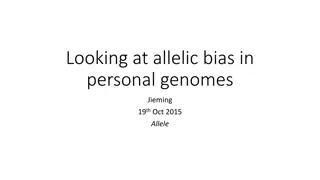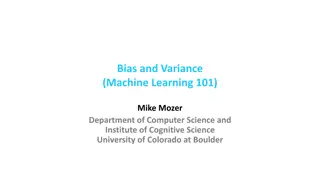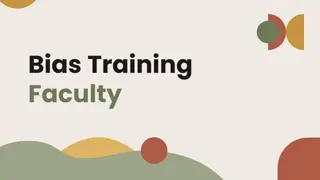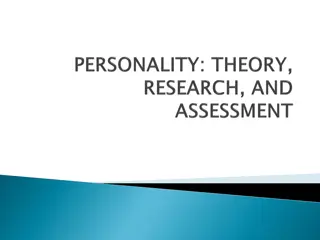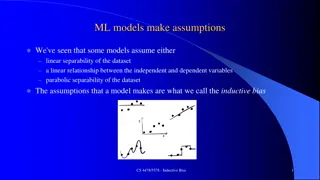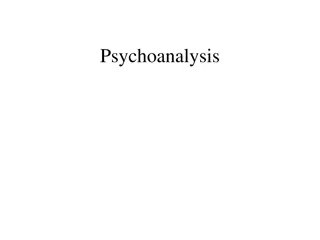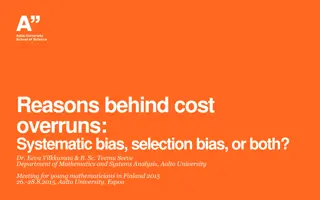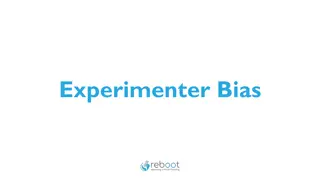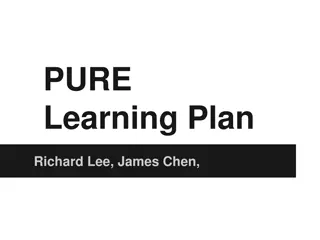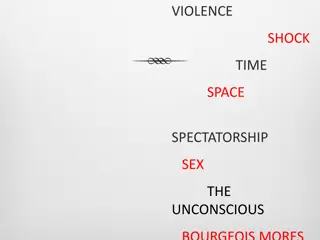Gus J. Solomon’s Voir Voir Dire Academy
Explore the world of Voir Dire Academy through images and resources, including federal and state court jury orientation videos, open-ended questions, and guidance on questions to avoid in Voir Dire. Engage in insightful content covering topics like unconscious bias, understanding implicit bias, and
1 views • 16 slides
Understanding Culture, Identity, Bias, and Diversity in the Workplace
This presentation highlights the importance of understanding culture, identity, bias, and their impacts in the workplace. Through courageous conversations and diversity training, participants learn to unpack implicit bias, combat bias, and develop teamwork skills. The session emphasizes staying enga
0 views • 19 slides
Unconscious Bias
Delve into the realm of diversity, equity, and inclusion through an interactive workshop focused on understanding unconscious bias, reducing bias in a safe space, intentional application in clinical settings, and successful interactions with diverse colleagues and patients. Engage in thought-provoki
1 views • 29 slides
Understanding and Avoiding Bias in Evidence-Based Responses
Recognizing bias in oneself and others is crucial when collecting evidence. Different types of bias, such as confirmation bias, can influence decisions and behaviors significantly. By exploring our own thinking and accessing curated resources to learn about bias, we can develop a deeper understandin
1 views • 14 slides
Evaluating Gender Bias in BERTi: Insights on Large Language Models
This study delves into gender bias evaluation in BERTi, a large language model trained on South Slavic data. It explores issues in language modeling, the impact of social biases in artificial intelligence, and training processes of Large Language Models (LLMs). Additionally, it discusses how LLMs le
11 views • 16 slides
Recognizing Hidden Bias in the Workplace
In the workplace, hidden bias, also known as implicit bias, can significantly impact hiring, employment decisions, and overall workplace dynamics. Deloitte's 2019 State of Inclusion Survey revealed that a substantial percentage of workers experienced bias at least monthly. Hidden biases can be based
3 views • 18 slides
Implicit Bias in Dance: Exploring Unconscious Beliefs and Behaviors
Explore implicit bias in the context of dance research through the lens of unconscious beliefs affecting judgments, behaviors, and social interactions. The discussion delves into the impact of implicit cognition on various aspects like self-esteem, social judgment, decision-making, and prejudice, hi
0 views • 16 slides
Understanding and Overcoming Bias in Interviewing
Bias in interviewing can arise from implicit and explicit prejudices, impacting perceptions and interactions with interviewees. Implicit biases are unconscious, while explicit biases are deliberate. Recognizing and addressing biases is essential to conduct fair and effective interviews. Examples ill
0 views • 17 slides
Overcoming Unconscious Bias in Talent Acquisition Process
Overcoming Unconscious Bias in Talent Acquisition Process emphasizes the importance of addressing unconscious bias in hiring practices through awareness and control. The content delves into defining unconscious bias, its impact on diversity, examples, and strategies for managing bias. The University
0 views • 19 slides
Understanding and Utilizing Bias in Legal Proceedings
Exploring the complexities of bias in legal settings, this content provides insights on identifying, addressing, and leveraging bias in litigation. From defining various forms of bias to strategies for cross-examination and case presentation, it equips legal professionals with practical knowledge to
0 views • 19 slides
Types of Bias in Epidemiological Studies
Bias in epidemiological studies can arise from misclassification of observations and exposures, leading to incorrect associations between variables. Observation bias, misclassification bias, and non-differential misclassification can impact the accuracy of study results, either minimizing difference
1 views • 11 slides
Understanding Diode Junction Biasing: Zero and Forward Bias Conditions
In the world of electronics, diode junction biasing plays a crucial role. This article delves into the concepts of zero and forward bias conditions for diodes. When a diode is zero-biased, no external potential energy is applied, while in forward bias, a specific voltage is introduced to initiate cu
0 views • 21 slides
Is Your Analytics Software Lying to You_ How to Spot and Correct Data Bias
Data bias can distort your analytics and lead to misguided decisions. In this blog, learn how to identify common signs of data bias, understand its impacts, and explore effective strategies to correct it. Enhance the accuracy and reliability of your insights with practical tips and advanced tools, e
3 views • 8 slides
Hidden Biases Awareness Workshop: Exploring Unconscious Prejudices
Delve into the complexities of hidden biases through an insightful workshop discussing stereotypes, microaggressions, and unconscious prejudice. This session aims to raise awareness, encourage dialogue, and provide resources for personal development in diversity and inclusion. Explore real-world exa
0 views • 12 slides
Understanding Implicit Bias in Medical Education
Delve into the origins, forms, and manifestations of bias in clinical and medical education settings. Learn strategies to mitigate and address bias through a detailed exploration of terms like System 1 and System 2 thinking, implicit bias, race/racism, sexism, microaggressions, and more. Gain insigh
6 views • 27 slides
Understanding Transistor Bias Circuits for Linear Amplification
Transistor bias circuits play a crucial role in setting the DC operating point for proper linear amplification. A well-biased transistor ensures the signal variations at the input are accurately reproduced at the output without distortion. Various biasing methods such as Voltage-Divider Bias, Emitte
0 views • 7 slides
Unconscious Bias, Diversity, and Tech: A Call for Action
Explore the impact of unconscious bias on diversity in the tech industry, highlighting the low representation of women and minority groups. The article emphasizes the societal biases that hinder progress and offers a call to action for addressing these issues.
11 views • 15 slides
Uncovering Archetypes: Dive into the Depths of Human Collective Unconscious
Explore the profound concept of archetypes, rooted in Carl Jung's theory of the collective unconscious. Discover how archetypes manifest in art, literature, and the human psyche, shaping our understanding of universal patterns and symbols that connect our past to the present.
0 views • 7 slides
Managing Reporting Bias in Systematic Reviews - Strategies and Consequences
Reporting bias poses a significant threat to the accuracy of systematic reviews, with publication bias affecting up to 50% of trials. This bias distorts treatment effect estimates, leading to exaggerated outcomes. Strategies to mitigate reporting bias include searching bibliographical databases, exp
1 views • 17 slides
Overview of Psychoanalytic Criticism and Object Relations Theory
Psychoanalytic Criticism, originating with Sigmund Freud and further developed by Melanie Klein and Jacques Lacan, explores the intricate workings of the human mind, delving into the tripartite structure of the ego, id, and superego. The theory encompasses concepts such as the interpretation of drea
0 views • 10 slides
Understanding Transition Bias and Substitution Models in Genetics
Transition bias and substitution models, explored by Xuhua Xia, delve into the concepts of transitions and transversions in genetic mutations, the causes of transition bias, the ubiquitous nature of transition bias in invertebrate and vertebrate genes, the mitochondrial genetic code, and RNA seconda
1 views • 25 slides
Insights from "Thinking, Fast and Slow" and Neuroscience Advances
Explore the shift in understanding human rationality from the mid-20th century to the present through works like "Thinking, Fast and Slow" by Daniel Kahneman. Delve into the impact of strong emotions on decision-making, the role of unconscious thinking in decision processes as discussed in "Stranger
0 views • 63 slides
Gender Bias in STEM Faculty Recruitment
Research indicates that women are underrepresented among STEM faculty members, potentially due to bias in the search process. Studies show evidence of bias against women candidates in male-dominated fields like mechanical engineering, leading to lower hiring rates. Another study revealed bias in fac
0 views • 29 slides
Addressing Diversity Disparities in Tech Through Unconscious Bias Awareness
In the tech industry, diversity remains low despite its proven benefits in innovation and problem-solving. This presentation reveals shocking statistics on the underrepresentation of women and minority groups in computing fields. It emphasizes that societal bias, not inherent flaws in minority group
0 views • 15 slides
Understanding Psychodynamic Psychotherapy: Unconscious Exploration
Psychodynamic psychotherapy focuses on making the unconscious conscious through techniques like free association, dream analysis, and defense mechanisms. Clients gain insight into hidden thoughts and emotions, uncovering unconscious wishes and addressing resistance in therapy sessions.
0 views • 17 slides
Addressing Bias-Related Incidents at Concordia University
The report discusses bias reporting at Concordia University, highlighting the importance of understanding and addressing bias-related incidents. It covers examples of bias, distinction between bias incidents and hate crimes, and strategies for response. Presenters from the Office of Multicultural En
0 views • 11 slides
Women Empowerment in Tech: Overcoming Bias and Building Inclusive Environments
The history and current efforts in empowering women in tech are highlighted through examples from UC San Diego, Harvey Mudd College, and Carnegie Mellon University. Challenges like unconscious bias and self-underestimation are addressed, showcasing initiatives that have led to increased female repre
0 views • 26 slides
Addressing Implicit Bias in Medical School Admissions
Increased diversity in the healthcare workforce benefits health outcomes, but implicit bias can impact candidate selection in medical school admissions. This advocacy project aims to address implicit bias by developing training sessions for new members of the admissions committee at UNM SOM, focusin
0 views • 9 slides
Uncovering Bias in Research: Foundation of Science
Exploring the presence of bias in research, this compilation delves into various types of biases such as confirmation bias and fundamental attribution error. It also addresses the challenges of explaining behaviors rooted in biases and offers insights on reducing bias in the scientific process. Thro
0 views • 6 slides
Investigating Allelic Bias in Personal Genomes
This study delves into allelic bias in personal genomes, examining the influence of various factors such as sequencing datasets, removal of reads with allelic bias, and the impact on allele-specific single nucleotide variants (AS SNVs). The revised AlleleDB pipeline proposed includes steps for const
0 views • 6 slides
Understanding Bias and Variance in Machine Learning
Exploring the concepts of bias and variance in machine learning through informative visuals and explanations. Discover how model space, restricting models, and the impact of bias and variance affect the performance of machine learning algorithms. Formalize bias and variance using mean squared error
0 views • 21 slides
Enhancing Bias Training for Faculty at the University of Utah
Transform faculty training on bias at the University of Utah through engaging slides designed to raise awareness, combat implicit bias, and promote inclusivity. Empower educators to recognize and address bias in their teaching practices for a more equitable learning environment.
0 views • 21 slides
Understanding Personality: The Freudian Perspective
Personality refers to an individual's unique behavioral traits, which can be categorized into specific traits like openness, conscientiousness, extraversion, agreeableness, and neuroticism. Various theories, including Freud's psychoanalytic theory, attempt to explain personality by focusing on uncon
0 views • 24 slides
Understanding Inductive Bias in Machine Learning
Machine learning models rely on inductive bias, which are the assumptions made by algorithms to generalize from training data to unseen instances. Occam's Razor is a common example of inductive bias, favoring simpler hypotheses over complex ones. This bias helps algorithms make predictions and handl
0 views • 20 slides
Understanding Implicit Bias: Exploring Bias, Stereotypes, and Discrimination
Explore the concept of implicit bias through discussions about prior knowledge, feelings pre and post taking implicit association tests, and how this awareness can be applied beneficially in personal and classroom settings. Definitions of implicit bias, stereotypes, prejudice, and discrimination are
0 views • 21 slides
Understanding Psychoanalysis: Unconscious Dynamics and Mental Health
Psychoanalysis, as pioneered by Sigmund Freud, delves into the dynamic interactions between the conscious mind and the unconscious, exploring hidden conflicts, desires, and fears. By examining symptoms, dreams, and neuroses, psychoanalysis seeks to bring repressed memories and concerns into consciou
0 views • 28 slides
Understanding Cost Overruns in Projects: Systematic Bias vs. Selection Bias
Cost overruns in projects can be attributed to systematic bias, like optimism bias and strategic misrepresentation, or selection bias where projects with low estimated costs are more likely to be selected leading to underestimation. Mitigating these biases is crucial for accurate project budgeting a
0 views • 21 slides
Understanding Experimenter Bias in Research Studies
Experimenter bias occurs when researchers introduce their own biases into an experiment, potentially impacting the outcome. This bias can manifest in various ways, such as manipulating results or selecting participants who confirm preconceived notions. Through examples in studies about toddler sleep
0 views • 9 slides
Investigating Bias in Newspaper Articles through Natural Language Processing
The project, mentored by Jason Cho and advised by Professor Eric Meyer, focuses on automatic bias detection in newspaper articles. It involves recognizing similar article topics and detecting bias using tools like OpenNLP and Python NLTK. The endeavor aims to uncover words correlated with bias and a
0 views • 5 slides
Surrealism in Art: Exploring Violence, Space, and the Unconscious
Dive into the world of Surrealism through artworks and manifestos of prominent figures such as Salvador Dalí, Luis Buñuel, and Andrè Breton. Explore themes of violence, shock, time, space, spectatorship, sex, and the unconscious in their works, reflecting the rebellion against bourgeois mores and
0 views • 24 slides

